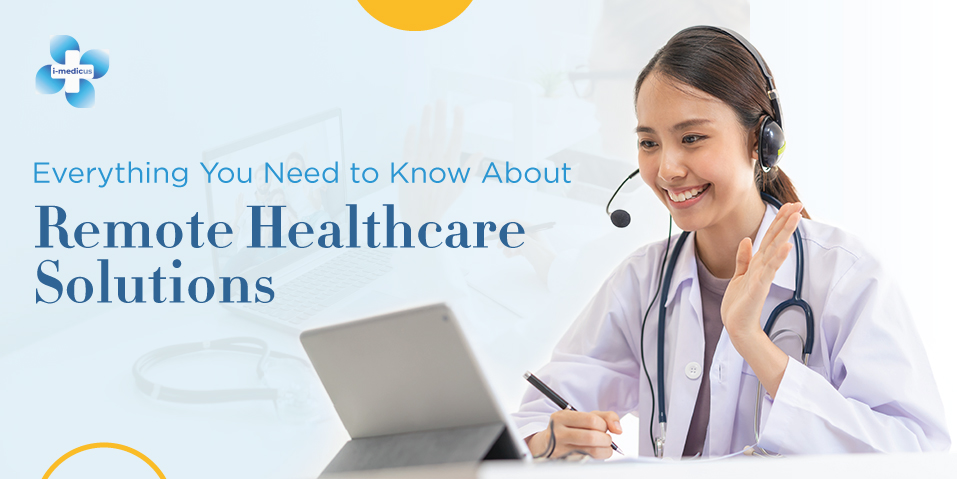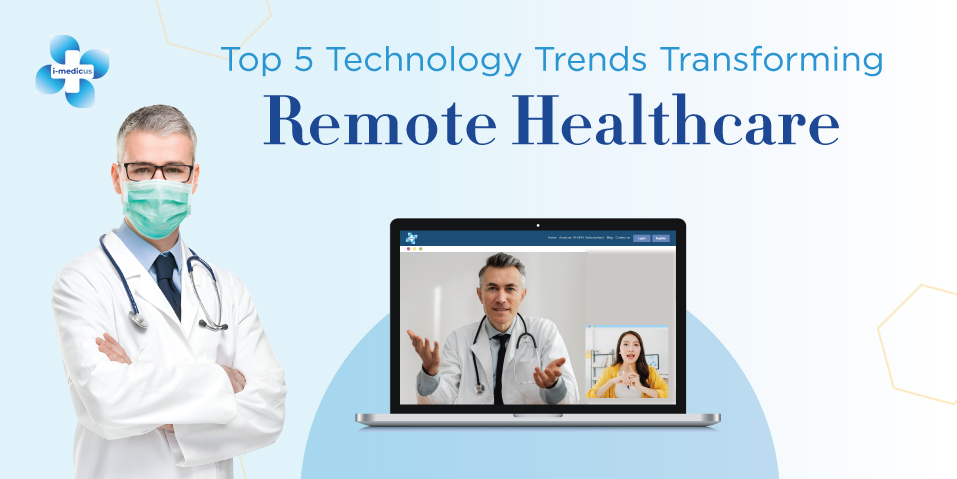Over 66% of the world’s population or nearly 7 in 10 people on Earth have a mobile phone in their hand. But do they have access to quality affordable healthcare? The answer is “NO- they don’t”. In fact, as per the WHO, only half of the world’s population has access to essential health services. But can we make it better? Remote healthcare solutions like telehealth can surely be a game changer.
What is a Remote Healthcare Solution?
In simple terms, a remote healthcare solution is any technology or service that allows healthcare providers to offer care from a distance. With a remote healthcare solution, unless necessary, there is no need for in-person visits.
Key Aspects of a Remote Healthcare Solution
- Technology-driven: Reliance on tools such as telehealth services, wearable devices, mobile apps, and online communication.
- Focus on remote interaction: Communication through virtual channels like video calls, secure messaging, and remote data monitoring.
- Applications in various areas: Use in consultations, diagnosis, treatment monitoring, chronic disease management, and mental health support.
Types of Remote Healthcare Solutions
- Telehealth Services: Enable video calls with doctors, specialists, or therapists from any location.
- Remote Patient Monitoring: Wearable techs like smartwatches track health data like heart rate or blood pressure for doctors’ insights.
- Store-and-Forward Technology: Streamlines sharing X-rays or scans securely online.
- Mobile Health (mHealth) Apps: Facilitate health and wellness management through smartphones and provide health information.
- Online Therapy Platforms: Offer remote access to therapists through video or chat for convenient mental health support.
Remote Healthcare Solution Benefits
Remote healthcare helps patients a lot, and guess what? It’s super helpful for doctors too! In 2021, a report said that the use of telehealth went up by a massive 3,800% when COVID-19 started.
Benefits for Providers:
- Connect with more patients: Reach people in remote areas or with limited mobility, expanding your patient reach.
- Work more efficiently: Cut down on paperwork and administrative tasks by using virtual consultations and remote monitoring.
- Build stronger patient relationships: Engage with patients regularly through convenient virtual touchpoints, fostering better connections.
- Lower costs: Save resources by conducting virtual consultations, eliminating the need for physical space and reducing overhead.
Benefits for Patients:
- Convenience at Home: Patients can quickly schedule appointments, consult online, and even access their health records on the go.
- Time and Money Savings: Whether for routine follow-up care or periodic assessments, telehealth helps avoid unnecessary trips to the doctor.
- Specialist Access: A benefit visible particularly in underserved or remote areas, telehealth services connect patients with specialists beyond their local area.
- Self-Management: Take charge of your health with mHealth apps for tracking data, managing medications, and learning about your condition.
Privacy and Security in Remote Healthcare
While remote healthcare offers numerous benefits, concerns regarding patient data privacy and security remain significant. Here are some key concerns:
- Data Breaches Risk: Sensitive health info can be hacked, risking identity theft or misuse.
- Data Sharing Concerns: Sharing patient data among providers and third parties raises transparency and control issues.
- Security Weaknesses: Weak encryption, outdated software, and human errors can expose patient data in remote healthcare systems.
Non-compliance Penalties for Telehealth Services & Remote Care
Ensuring patient info stays safe during telehealth is crucial. If healthcare providers don’t follow the rules, they can face serious penalties. Here’s a quick look:
- HIPAA Violations: Fines range from $100 to $50,000 per violation, reaching up to $1.5 million per year for not fixing issues.
- State Laws: Some states have extra fines for data breaches, varying widely and sometimes being stricter than HIPAA.
- HIPAA Breach Notification Rule: Not informing people and HHS about a breach on time can result in daily penalties, reaching up to $1.5 million per year.
- Reputational Damage: Breaking rules hurts a provider’s reputation, causing loss of patient trust and referrals, and causing financial damage.
- Additional Considerations: Providers might be excluded from federal programs, impacting their ability to operate beyond just financial penalties.
Data Compliance Best Practices and Regulations
To address these concerns, several best practices and regulations are in place:
- HIPAA Compliance: It ensures patient health info is safe, with similar rules in other countries.
- Data Security: Keep data safe by encrypting it, even during storage and transmission.
- Strong Verification: Add extra security with multi-factor authentication, going beyond just passwords.
- Controlled Data Sharing: Share patient data only with their express agreement, and only what’s needed for healthcare reasons.
- Continuous Security Measures: Keep systems safe with regular checks and security audits.
- Patient Empowerment: Teach patients about their privacy rights for informed choices.
Telehealth Services that Save You Sleepless Nights and Provide Patients Peace of Mind!
i-medicus: Simplified remote care, connected healthcare
Feeling overwhelmed by the complexities of integrating telehealth into your existing practice? i-medicus is here to help! We offer a user-friendly platform designed specifically for healthcare professionals, bridging the gap between remote care and your established workflow.
Effortless Telehealth Onboarding:
- No lengthy setup or complex interfaces. i-medicus boasts an intuitive dashboard, allowing you to jump right into managing your virtual practice with ease.
- Say goodbye to scattered patient information. i-medicus offers a centralized hub for your patient list, appointments, and detailed health records, streamlining your remote care coordination.
- Secure communication is a priority. Whether it’s video or audio consultations, i-medicus ensures HIPAA-compliant interactions for both you and your patients.
- Payment/Call Records: Plus, access to earnings, payment records, and call history provides transparency and financial clarity.
Seamlessly Integrate with Your Existing System:
i-medicus goes beyond offering just a standalone telehealth solution. We bridge the gap between remote and traditional care by integrating seamlessly with your existing clinic software:
- Stop juggling multiple platforms! Manage both in-person and remote patients effortlessly from a single platform.
- Eliminate Unnecessary Complexity. Streamline your processes, reducing the need for unnecessary complications.
- Manage patient info, access health history, generate reports, and write e-prescriptions from anywhere, ensuring complete care delivery.
- Ensure patients get the same quality care, whether in-person or remote, with streamlined collaboration.
i-medicus is more than a telehealth app. It’s a complete end-to-end remote care solution that your patients will truly love and recommend. To learn more about i-medicus features and benefits contact us now!
FAQs
1. When it comes to remote patient monitoring solutions, are there other devices beyond smartwatches?
Absolutely! Smartwatches have become trendy, but there are other devices for remote patient monitoring, each with unique benefits.
Wearable Sensors like patches and smart rings for continuous monitoring of heart rate, respiration, blood oxygen levels, etc. Some even track your activity and sleep.
There are also non-wearable remote patient monitoring solutions such as
- Blood Pressure Monitors: Measure and send blood pressure readings remotely so doctors can keep an eye on your heart health.
- Glucose Checkers: Handy for diabetes—monitor blood sugar levels remotely, and doctors can step in if needed.
- Smart Scales: Keep tabs on weight and body composition, sending data for insights into overall health.
- Pulse Oximeters: They measure blood oxygen—important for breathing and sleep conditions.
2. Does i-medicus support all these remote patient monitoring solutions?
Yes, our app is versatile and can integrate with a variety of remote monitoring solutions. However, we do take into account factors like HIPAA or other compliances, technical compatibility with our app, and interoperability standards of the specific wearable or non-wearable devices.
3. Is the i-medicus app easy to set up?
Convenience was a big priority when we were designing the i-medicus app. Our solution is both mobile and web-based which means you can use it on your desktop systems, mobile, etc.
And setup is easy too. You don’t need to purchase any additional hardware or invest in data storage or security. The app does everything for you seamlessly. And, our team is available 24*7 to help you out with any concerns both before and after you start your telehealth services.
4. Is i-medicus available on a trial basis?
No, for now we don’t offer any trial service. But you can book a free demo and see it in action. We will assign an expert who will walk you through all the key features, and the setup process, and answer all your queries.
5. Are i-medicus telehealth services only for US citizens?
By design, i-medicus ensures HIPAA compliance which means it is ready to use for US providers and citizens. However, HIPAA compliance is only one among the many data security laws and guidelines that i-medicus complies with. We suggest you book a meeting with our team and discuss in detail your region-specific data privacy and regulation needs.
6. What is the future of telehealth?
The future of telehealth services or any other remote patient monitoring solution for that matter is AI-driven. Moving forward we will see more AI features across not just telehealth but healthcare at large- from patient engagement and diagnosis to treatment and post-care. i-medicus also offers AI-first features on demand depending on provider/patient needs and goals.
7. Does i-medicus offer remote healthcare in UAE?
i-medicus will start to offer remote healthcare services shortly in the UAE. We bridge the technology gap that helps make remote care easier to access, safer, and outcome-driven. And, as far as remote healthcare in UAE is concerned, we are partnering with providers there to offer convenient and affordable remote healthcare solutions for UAE residents.



